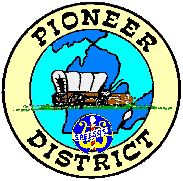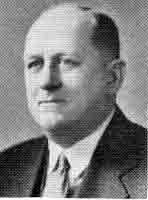


Fourth Place Trophy
|
On March 9, 1941, the first state or district quartet contest ever held under SPEBSQSA auspices was hosted by the Grand Rapids Chapter. Again the ballroom of the Pantlind Hotel was the scene; and some 28 quartets went through their paces for a distinguished and talented panel of judges composed of Cy Perkins, Phil Embury, Frank Thorne, Maurice Reagan and Robert Hamp. The judges at that time had no written rules or guidelines, so they had to figure out a system of grading and categories before the contest. Some of their findings went into the rules later adopted and are still part of our judging rules. The master of ceremonies was our founder, O.C. Cash, who came from Oklahoma for the occasion and he enjoyed every minute of it. The contest winners down to five places were SAWDUST FOUR of Muskegon; DETROIT TURNERS (Jim Creed, Ed Pazik, Mark Roberts and Wally Joure); LEGION FOUR of Detroit (Monty Marsden, Al Frank, Glenn Shields and Howard Tubbs); BIG FOUR of Detroit (Hugh Ward, LeRoy McKinney, Bob Weil and Joe Wolff) and SONGMASTERS of Lansing (Robert Andrews, Walter Scutt, Ross Bearup and Harold McAttee) respectively.
Picture of trophy donated by John SzewcThis contest was well handled by the Grand Rapids crew and was an unqualified success, which helped to assure the continuation of the District contest as an annual feature. While the singing at that time did not measure up to today's standards, because no one would have thought of practicing and working at it the way today's quartets do, the singing was more interesting in many ways and particularly in musical arrangements.

Mark Roberts
|
As Mark Roberts said, "There were no published arrangements in those days and practically all quartets used their own arrangements. Thus we did not have a note for note rendition of the same songs by different quartets, such as we quite frequently have in today's contests. We also heard more lyric tenor voices and big booming basses which, again, is another story. The 1941 contest was a stag affair, the last, by the way; and we were still carrying on in the grand tradition of barbershop singing."
Roberts related further, "We said that, but the ladies were becoming inquisitive about the activities; and why shouldn't they when some of them had been led to believe that the meetings lasted from Friday evening until Saturday at noon. We know, of course, that barbershoppers have the most tolerant women in the world, and we were not the least bit apprehensive as to their acceptance of our music. We were not sure at all of women generally; but, as might have been expected, we found some who had a genuine liking for our music; some who just liked to be around men, the singing kind or otherwise; and some who despised it but gritted their teeth and bore with it in a brave attempt to be agreeable. Some gals decided that they too wanted to participate in our contests; and, in one case, four gals seriously threatened to get a Court order to compel us to accept their entry in our competition. We stood bravely by our `male only' eligibility rules because, otherwise, we could visualize a far more sinister situation that would develop. That would be when we went home some evening to inform the little woman that the new tenor in the quartet was really a shapely blond soprano, and the lead was a gorgeous red head whose chest expansion, when she took a big breath for that `Sweet Sixteen' swipe, was both amazing and delightful. This kind of hanky-panky could have led to arsenic in the breakfast coffee as one of the more gentle forms of exterminating barbershoppers. Eventually and fortunately, the Sweet Adeline's was organized, and the frustrated femmes found an organized outlet for their singing; and, outwardly at least, a happy harmony coexistence between our Society and the Adeline's which continues to the present."
Michigan's fast growth and efficient organization were recognized throughout the budding Society, and everyone was looking to the Wolverine State for leadership in 1941. The State Association at a meeting held in Lansing, June 7, 1941, re-elected all of its officers for another year.
MICHIGAN GAINS STATURE:Michigan had no quartets in the national contests of 1939 and 1940, but in St. Louis on July 3-5, 1941, Michigan's top two quartets, the District Champion SAWDUST FOUR and the runner-up DETROIT TURNERS competed. While our top two quartets did not come back bemedalled, they were finalists.
 Carroll P Adams
|
It was at this convention that Michigan really came into its own. Grand Rapids was awarded the 1942 national convention, Carroll Adams was elected national president for the 1941-42 term. Joseph Stern of Kansas City was elected secretary-treasurer, Ray Granger, Tulsa, master of ceremonies, O.P. Erickson, Tulsa, director of publicity, and Deac Martin, Cleveland, national historian. The elected vice presidents were Phil Embury, Warsaw, N.Y.; Dr. Mark S. Nelson, Canton, Ill.; Jos. F. Wodicka, St. Louis, Mo., and Frank Winchell, Jacksonville, Fl. In addition, of the 21 men elected to the National Board of Directors, Michigan had three, those being Roscoe Bennett from Grand Rapids, Ed Schwoppe from Lansing, and Joe Wolff from Detroit (he had also served in 1940).
The Board could not have selected a better man for the job of president than Carroll Adams. He was truly a man of vision and came to his post well-armed with the type of knowledge necessary to captivate and mold the growing Society into an organization as to chapters, financial throes, contests and judging, and the augmentation of Society activities through committees wrestling with developmental and organizational policies. The successful Society we have today can be largely laid at Carroll Adam's doorstep, for we are still guided by the precepts he established in those early days. Even our district, which he helped to establish in 1940 and 1941, is still today one of the leading districts in administration and financial matters in the Society due to his foresight.
YOU'RE AS WELCOME AS THE FLOWERS IN MAY:During a 1968 interview by International Historian Dean Snyder, Joe Wolff related to him the story of the introduction of this arrangement to the Society. The story, as Joe related it to Dean, is as follows: "Our quartet (that was the AMBASSADORS then) was invited to attend the Saginaw Parade of Quartets over there, and we all arrived about noon. We saw Phil Embury there, after not having seen him for some time. We got together with Phil, and then Tim Weber showed up, and as the gang congregated there was Cy Perkins. We noticed that Perkins was excusing himself from our company and making frequent trips to the bar room. I said to Phil, `If Cy Perkins is going to keep that up, he won't be here to listen to the quartets.' So I checked into the idea of getting a piano up in our room and to see whether we could put our time to better use. It so happened that we were talking about old numbers, and so on. I happened to think of one that Phil Embury had never heard of. This was `You're as Welcome as the Flowers in May.' I hummed it to him. He said he'd never heard it. I said, `We'll get Perkins and see if we can work out an arrangement.' So we did, and that's how `You're as Welcome as the Flowers in May' became so popular in the Society. It was our arrangement."
THE SOCIETY'S FIRST CODE OF ETHICS INTRODUCED:Joe Wolff, who attended the St. Louis convention as a board member, submitted a first copy of the Code of Ethics. The Code remains almost the same today as it was originally presented, except for item number 10—"We shall render all possible altruistic service through the medium of barbershop harmony." Joe felt that under this specific item, one could find an excuse for connecting the Society with almost any extraneous cause, and that's where he felt the Society strayed off course. Joe was very much against the adoption of our Service Project, the Institute of Logopedics.
In his words; "At the risk of being characterized as a person who is against God and motherhood, I am referring to the introduction of fund solicitation for the cause of Logopedics. I shall not dwell on the subject, except to say that the Society was not organized for this nor any similar purpose. Charity, as the old axiom has it, begins at home." And, there were a lot of people in those early days who felt as Joe did.
When queried by Snyder as to the first beginnings of the Code of Ethics, Wolff stated that at the time of the interview (1968) he was a little vague on all of the details; but he did say that there were a lot of loose ends to be tied together at the midwinter board meeting in 1941. Since he was a member of that board, he mentioned to them that some kind of a code had to be established to serve as sort of a guide for the behavior of our members. He stated, "They all seemed to agree, and so I proposed this code of ethics, which, of course, was accepted. It had some very minor changes, but is still in existence, and I hope that it is a good one." Actually, this code is one of the very fundamental stones of all the things Joe has done for the Society. The Code of Ethics is a code which should be recognized and practiced by the members of the whole Society. As Duane Mosier, one of the former Pioneer District Historians, has stated, "It would be a far better Society, in my opinion, if the members would take hold of that code and really commit it to memory and commit it to their practice day by day".
| [index] | [1940] | [1941] | [1942] | [1943] | [1944] | [1945] | [Contents] |